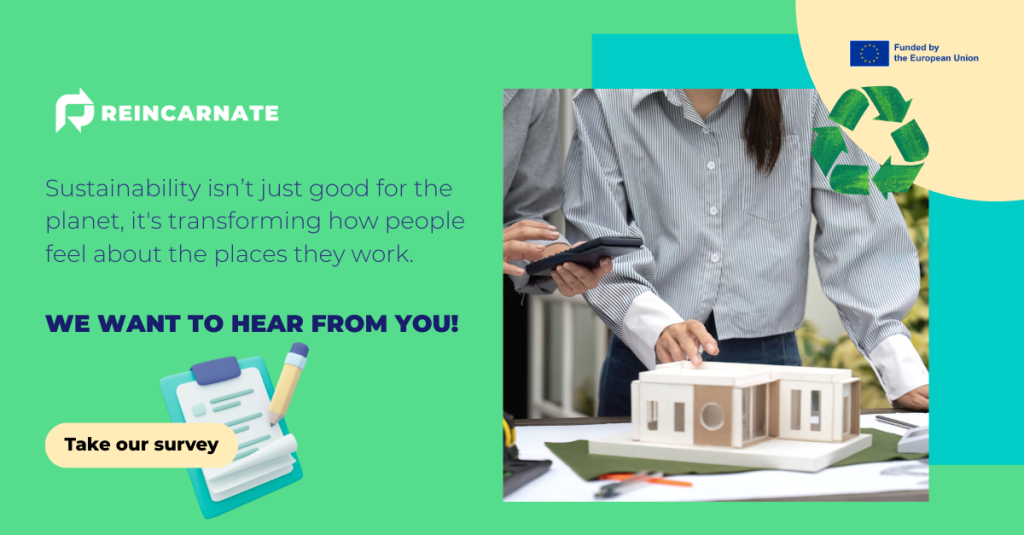Sustainability isn’t just good for the planet it’s good for business. As part of the research carried out by our partner Erasmus University Rotterdam within the Reincarnate project, a survey is examining how employees perceive their organization’s sustainability efforts. The survey takes approximately 5–7 minutes to complete and has been approved by the university’s internal ethics committee.

Over the last two decades, research has shown that companies with strong sustainability practices don’t just attract more customers; they also attract more employees.
Back in 2000, Greening and Turban revealed that organizations with positive corporate social performance (CSP) were far more appealing to job seekers. Just two years later, Backhaus, Stone, and Heiner (2002) found that one factor stood out in particular: environmental performance. In other words, people want to work where their values align with companies that care about the world around them.
That part of the story is well established: sustainability attracts talent.
But here’s where things get interesting. What happens after the honeymoon phase? Attracting employees is one thing. Keeping them motivated, engaged, and loyal over the long term is another challenge entirely.
The Missing Link: Engagement and Retention
Employees aren’t just passive observers of a company’s sustainability commitments they want to be part of it. They want to see their company walk the talk and make changes that matter. When employees feel that their organization is serious about social responsibility and circular practices, something powerful happens:
They advocate for the company inside and outside the workplace.
They feel a stronger sense of legitimacy in being part of the organization.
They are more likely to stay and contribute to long-term change.
On the flip side, if sustainability is treated as a buzzword or a marketing checkbox, employees notice and they’ll eventually look elsewhere.
Why This Matters Now
With talent shortages in many industries and younger generations entering the workforce with higher expectations, sustainability isn’t a “nice-to-have” anymore. It’s becoming a core factor in employee attraction, advocacy, and retention.
Which brings us to the key question driving this study:
👉 To what extent does corporate commitment to social responsibility and circular practices influence employee advocacy and enhance employees’ perceptions of organizational legitimacy?
The target audience we are aiming for is employees in the construction, architecture, and engineering sectors. Reaching respondents from these groups will be critical in ensuring that the study captures relevant and meaningful insights. The results will be shared through the Reincarnate project (website, academic publications, or related channels) once the study is completed.
The answer could reshape not just how companies talk about sustainability, but how they live it day in and day out.
Because in the end, employees don’t just want jobs. They want to be proud of where they work. And that pride, when fueled by sustainability, can be the real competitive advantage.
Take the Reincarnate Survey today and share your perspective on sustainability in the workplace.
References:
Backhaus, K. B., Stone, B. A., & Heiner, K. (2002). Exploringthe Relationship Between Corporate Social Performance and Employer Attractiveness. Business & Society, 41(3), 292–318. https://doi.org/10.1177/0007650302041003003
Greening, D. W., & Turban, D. B. (2000). Corporate Social Performance As a Competitive Advantage in Attracting a Quality Workforce. Business & Society, 39(3), 254–280. https://doi.org/10.1177/000765030003900302
